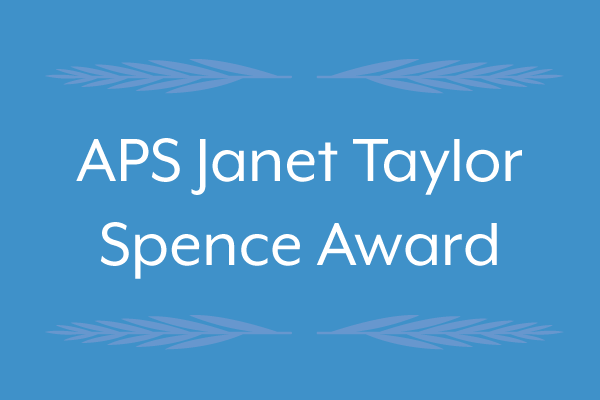Eight Psychological Scientists Receive 2022 APS Janet Taylor Spence Award for Transformative Early-Career Contributions

The Association for Psychological Science (APS) is pleased to announce the eight recipients of its 2022 Janet Taylor Spence Award for Transformative Early Career Contributions. The Spence Award recognizes APS members who have made transformative early career contributions to psychological science.
“The winners of the 2022 APS Spence Award represent some of the brightest and most innovative young psychological scientists in the world,” said APS Executive Director Robert Gropp. “I join my colleagues in applauding the zeal and creative work of these remarkable individuals.”
The Spence Award is named in honor of Janet Taylor Spence, the first elected APS President. Spence’s career exemplified transformative contributions to psychological science. She developed new approaches to research and pioneering tools, including the Taylor Manifest Anxiety Scale and the Attitudes Toward Women Scale. She also epitomized the spirit of crossing disciplinary boundaries with work on topics ranging from schizophrenia to developmental psychology to gender bias.
2022 APS Janet Taylor Spence Award Recipients
- Brian Anderson, Texas A&M University, is investigating the mechanisms by which reward learning changes how we direct our attention in the future.
- Oriel FeldmanHall, Brown University, merges multiple different fields, including behavioral economics and social psychology, with imaging and psychophysiological techniques to investigate the brain mechanisms that support these complex processes.
- Brett Ford, University of Toronto, is examining the basic science and health implications of how individuals think about and manage their emotions.
- Antonia Kaczkurkin, Vanderbilt University, is working to understand the neurobiological mechanisms that contribute to the etiology of internalizing disorders.
- Neil Lewis, Jr., Cornell University, studies how the interplay between people’s identities and social contexts influence people’s motivation to pursue their goals, and their success in goal-pursuit efforts.
- Patricia Lockwood, University of Birmingham, is exploring the neurocognitive foundations of social learning and decision-making across the lifespan and in psychiatric and neurological disorders.
- Jason Okonofua, University of California, Berkeley, examines social-psychological processes that contribute to inequality.
- Kai Chi (Sam) Yam, National University of Singapore, is researching judgment and decision-making, leadership, organizational behavior, and business ethics.
The 2022 award recipients will be featured in an upcoming issue of the Observer, the APS member magazine, and the APS podcast Under the Cortex, as well as honored publicly in 2022.





APS regularly opens certain online articles for discussion on our website. Effective February 2021, you must be a logged-in APS member to post comments. By posting a comment, you agree to our Community Guidelines and the display of your profile information, including your name and affiliation. Any opinions, findings, conclusions, or recommendations present in article comments are those of the writers and do not necessarily reflect the views of APS or the article’s author. For more information, please see our Community Guidelines.
Please login with your APS account to comment.